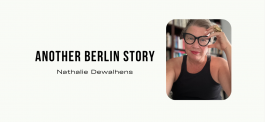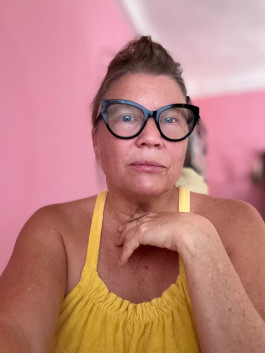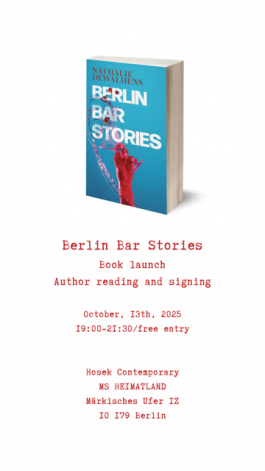
I arrived in Berlin-Lichtenberg in 2012 with my two children, straight from France, still in a relationship that was about to fall apart after more than 20 years. We separated a couple of months after arriving in Berlin, very carefully so as not to disturb the already uprooted children, then 7 and 15 years young.
I managed to stay strong by writing very bad poetry. And I was slowly falling in love with Berlin. Through dog walks I got to know hidden spaces in Berlin like amazing graveyards.
I found an amazing 140 M2 sublet near Monbijou park.
Berlin in those years was MDMA at Burning Bär in a castle, KitKat on a Sunday, tango in Kreuzberg. The city gave me permission to explore everything I'd been too afraid to touch. I became the Madame of the Poetry Brothel; this beautiful, absurd thing where poets performed in character, in costume, in intimate spaces. It was theatre and literature and sex work aesthetics all tangled together. I learned to be a leader. And I fell in love with all my poets. Very Berlin.
For "The 500 Hidden Secrets of Berlin" I walked around every neighbourhood. Documented every corner. I made myself an expert on a city I was still trying to fully understand. The book came out and suddenly I was the Berlin insider, the one who knew all the hidden places.
Then I became a bike tour guide.
It was hard work. It was often freezing. My body ached from pedaling through Kreuzberg, Mitte and Prenzlauer Berg. But showing people the Berlin I'd mapped out in my book, telling stories about the city while moving through it - that mended something in me. I loved it. The cold mornings, the tourists, the stories, the rhythm of it. And bonus: no need to go to the gym.


And then COVID hit.
No tourists. No income. No bike tours. No connection. Just me, alone in a very cosy but small Berlin apartment during lockdown, watching the city shut down around me. My kids were there somewhere in the city living their own lives seemingly avoiding me. They had to process this on their own and I wanted to honour that even though it hurt. The bars closed. The streets emptied. The Poetry Brothel disappeared. The city that never slept fell into this eerie, heavy silence.
I fell into a depression, triggered by the lockdown but fueled by many things I refused to look at for so many years. I know that now. At the time, I just thought I was tired, or stuck, or waiting for things to go back to normal. But normal never came back. Not the same normal, anyway. I changed, and so did Berlin.
Berlin's trauma became my trauma. The city had always carried this weight - the post Weimar years, both world wars, the Wall, the division, the whole cold war. But COVID added a new layer. The isolation. The fear. The way a city built on nightlife and movement and constant flux just... stopped. And I stopped with it.
I started writing "Berlin Bar Stories" way before that time, in the back room of ‘Another Country’, in one of the first Creative Writing courses organised by ‘The Reader’. It is probably because I was going through all that, that I found the structure of my book. The protagonist, Laura, is a Belgian costume designer in Babelberg in 2014, before everything fell apart. She's trying to heal from severe trauma while surrounded by other broken people in a broken city. She's not me, but she might have been.
In 2022, after seeing the flood of Ukrainian refugees coming to the city, I knew I had to leave. It was one war too many. When I saw the people arriving in Hauptbahnhof it hit something in me: I felt guilty for being overwhelmed. But it was almost a matter of life and death: I couldn’t go through another tragedy any more. And I was broke.
I sold my tiny apartment in Wedding and bought a huge house in a tiny Spanish village. Not because I stopped loving Berlin. But because staying meant staying depressed, staying stuck, staying in a city that had healed me once but couldn't do it again. The winters were too long. The traumas still too visible. The greyness seeped into everything. I needed sun. I needed warmth. I needed nature and a place to focus on my art, on my writing.
So finally, finally I found the rest and the right mindset to finish the book. Finishing that book was how I processed it all - the separation that brought me to my knees, the Poetry Brothel years, the healing the bike tours gave me, the depression that COVID dragged out of me. All those years of Berlin, the love and the darkness, the bars and the streets, the cold mornings and the late nights. It poured out.
My children are still there. Berlin is their home in a way it never fully was mine. They're Berliners - they belong to that city completely. I visit, but I don't stay. I can't.
I'm in Granada now, in the hills, where the light is so bright I gotta wear shades even in winter. Where I know my neighbours. Where lemons and mandarins grow in my tiny garden.
People ask if I miss Berlin. The answer is: it's complicated. I miss the version of myself who ran the Poetry Brothel, larger than life, I miss biking through the city in May and smelling the lime trees, feeling like I was exactly where I needed to be. I miss the purpose the tours gave me. I miss the chaos and dopamine kicks only this city can give you. I miss my kids, obviously.
But I don't miss the darkness. The way the city's trauma seeped into mine during COVID. The way isolation in Berlin felt different than isolation anywhere else - heavier, colder, more final. The way I couldn't tell anymore where the city's depression ended and mine began.
"Berlin Bar Stories" is what came out of all of that: a novel exploring severe trauma and messy humanity set in a city that's allergic to easy answers.
Maybe that's the real hidden secret of Berlin, the one I never wrote in the guidebook: the city will heal you if you let it. But it will also take everything you have. It will give you material for a lifetime. It will teach you a thing or two about hedonism. It will teach you how to survive.
I'm grateful for what Berlin gave me. But I'm also grateful I left. That I chose sun over shadow.
Granada gave me what Berlin couldn't anymore: stillness, space to just be, and the ability to write not because I'm processing trauma, but because I have something to say.
Berlin healed my broken hearts. Then it broke me anyway.
And in return, I got this book.
Love,
Nathalie
Related Articles:

I arrived in Berlin-Lichtenberg in 2012 with my two children, straight from France, still in a relationship that was about to fall apart after more than 20 years. We separated a couple of months after arriving in Berlin, very carefully so as not to disturb the already uprooted children, then 7 and 15 years young.
I managed to stay strong by writing very bad poetry. And I was slowly falling in love with Berlin. Through dog walks I got to know hidden spaces in Berlin like amazing graveyards.
I found an amazing 140 M2 sublet near Monbijou park.
Berlin in those years was MDMA at Burning Bär in a castle, KitKat on a Sunday, tango in Kreuzberg. The city gave me permission to explore everything I'd been too afraid to touch. I became the Madame of the Poetry Brothel; this beautiful, absurd thing where poets performed in character, in costume, in intimate spaces. It was theatre and literature and sex work aesthetics all tangled together. I learned to be a leader. And I fell in love with all my poets. Very Berlin.
For "The 500 Hidden Secrets of Berlin" I walked around every neighbourhood. Documented every corner. I made myself an expert on a city I was still trying to fully understand. The book came out and suddenly I was the Berlin insider, the one who knew all the hidden places.
Then I became a bike tour guide.
It was hard work. It was often freezing. My body ached from pedaling through Kreuzberg, Mitte and Prenzlauer Berg. But showing people the Berlin I'd mapped out in my book, telling stories about the city while moving through it - that mended something in me. I loved it. The cold mornings, the tourists, the stories, the rhythm of it. And bonus: no need to go to the gym.


And then COVID hit.
No tourists. No income. No bike tours. No connection. Just me, alone in a very cosy but small Berlin apartment during lockdown, watching the city shut down around me. My kids were there somewhere in the city living their own lives seemingly avoiding me. They had to process this on their own and I wanted to honour that even though it hurt. The bars closed. The streets emptied. The Poetry Brothel disappeared. The city that never slept fell into this eerie, heavy silence.
I fell into a depression, triggered by the lockdown but fueled by many things I refused to look at for so many years. I know that now. At the time, I just thought I was tired, or stuck, or waiting for things to go back to normal. But normal never came back. Not the same normal, anyway. I changed, and so did Berlin.
Berlin's trauma became my trauma. The city had always carried this weight - the post Weimar years, both world wars, the Wall, the division, the whole cold war. But COVID added a new layer. The isolation. The fear. The way a city built on nightlife and movement and constant flux just... stopped. And I stopped with it.
I started writing "Berlin Bar Stories" way before that time, in the back room of ‘Another Country’, in one of the first Creative Writing courses organised by ‘The Reader’. It is probably because I was going through all that, that I found the structure of my book. The protagonist, Laura, is a Belgian costume designer in Babelberg in 2014, before everything fell apart. She's trying to heal from severe trauma while surrounded by other broken people in a broken city. She's not me, but she might have been.
In 2022, after seeing the flood of Ukrainian refugees coming to the city, I knew I had to leave. It was one war too many. When I saw the people arriving in Hauptbahnhof it hit something in me: I felt guilty for being overwhelmed. But it was almost a matter of life and death: I couldn’t go through another tragedy any more. And I was broke.
I sold my tiny apartment in Wedding and bought a huge house in a tiny Spanish village. Not because I stopped loving Berlin. But because staying meant staying depressed, staying stuck, staying in a city that had healed me once but couldn't do it again. The winters were too long. The traumas still too visible. The greyness seeped into everything. I needed sun. I needed warmth. I needed nature and a place to focus on my art, on my writing.
So finally, finally I found the rest and the right mindset to finish the book. Finishing that book was how I processed it all - the separation that brought me to my knees, the Poetry Brothel years, the healing the bike tours gave me, the depression that COVID dragged out of me. All those years of Berlin, the love and the darkness, the bars and the streets, the cold mornings and the late nights. It poured out.
My children are still there. Berlin is their home in a way it never fully was mine. They're Berliners - they belong to that city completely. I visit, but I don't stay. I can't.
I'm in Granada now, in the hills, where the light is so bright I gotta wear shades even in winter. Where I know my neighbours. Where lemons and mandarins grow in my tiny garden.
People ask if I miss Berlin. The answer is: it's complicated. I miss the version of myself who ran the Poetry Brothel, larger than life, I miss biking through the city in May and smelling the lime trees, feeling like I was exactly where I needed to be. I miss the purpose the tours gave me. I miss the chaos and dopamine kicks only this city can give you. I miss my kids, obviously.
But I don't miss the darkness. The way the city's trauma seeped into mine during COVID. The way isolation in Berlin felt different than isolation anywhere else - heavier, colder, more final. The way I couldn't tell anymore where the city's depression ended and mine began.
"Berlin Bar Stories" is what came out of all of that: a novel exploring severe trauma and messy humanity set in a city that's allergic to easy answers.
Maybe that's the real hidden secret of Berlin, the one I never wrote in the guidebook: the city will heal you if you let it. But it will also take everything you have. It will give you material for a lifetime. It will teach you a thing or two about hedonism. It will teach you how to survive.
I'm grateful for what Berlin gave me. But I'm also grateful I left. That I chose sun over shadow.
Granada gave me what Berlin couldn't anymore: stillness, space to just be, and the ability to write not because I'm processing trauma, but because I have something to say.
Berlin healed my broken hearts. Then it broke me anyway.
And in return, I got this book.
Love,
Nathalie
Related Articles:
You need to load content from reCAPTCHA to submit the form. Please note that doing so will share data with third-party providers.
More InformationYou need to load content from Turnstile to submit the form. Please note that doing so will share data with third-party providers.
More InformationYou are currently viewing a placeholder content from Facebook. To access the actual content, click the button below. Please note that doing so will share data with third-party providers.
More InformationYou are currently viewing a placeholder content from Instagram. To access the actual content, click the button below. Please note that doing so will share data with third-party providers.
More InformationYou need to load content from hCaptcha to submit the form. Please note that doing so will share data with third-party providers.
More InformationYou need to load content from reCAPTCHA to submit the form. Please note that doing so will share data with third-party providers.
More InformationYou are currently viewing a placeholder content from Turnstile. To access the actual content, click the button below. Please note that doing so will share data with third-party providers.
More InformationYou are currently viewing a placeholder content from X. To access the actual content, click the button below. Please note that doing so will share data with third-party providers.
More Information